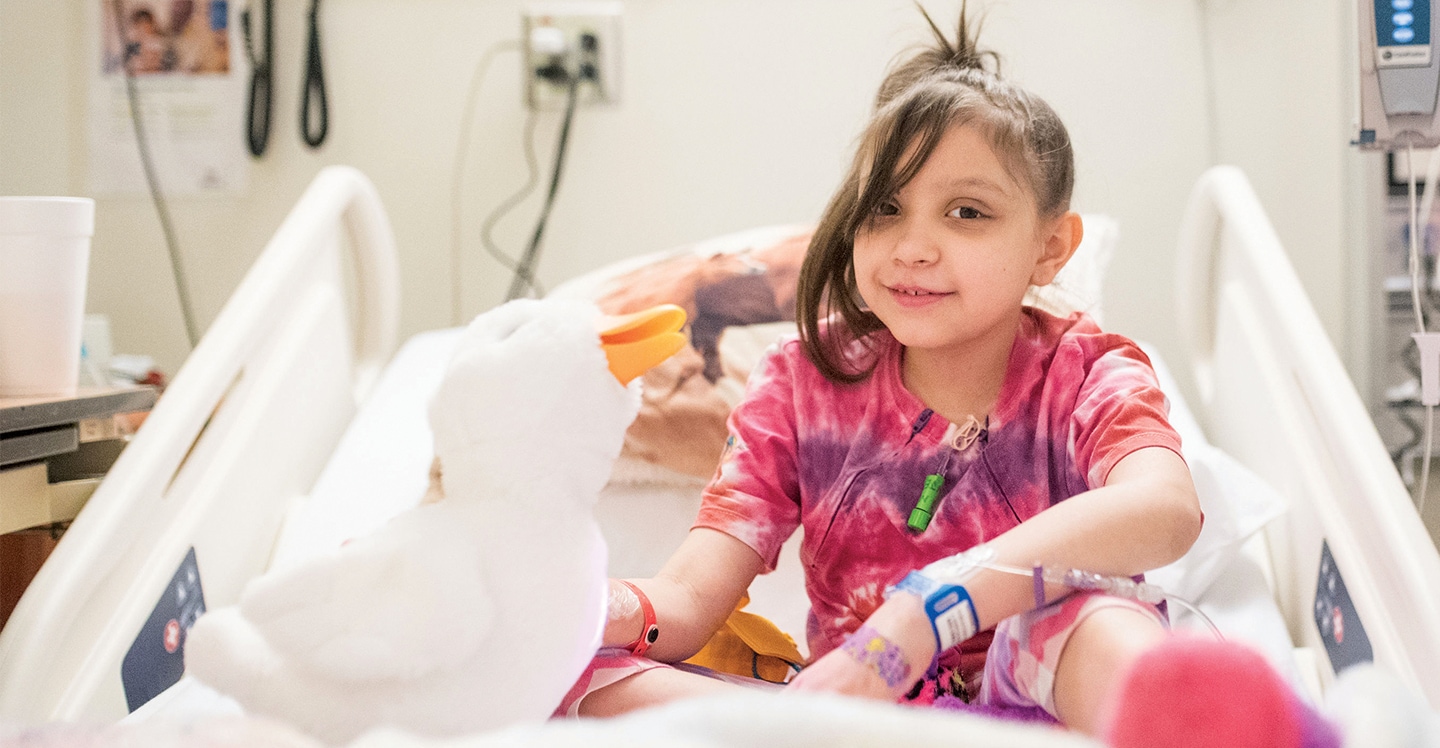Pediatric intestinal failure is a rare but serious condition that takes place when a child’s small or large intestine is unable to properly absorb vitamins, nutrients, minerals and water from food.
What causes pediatric intestinal failure?
The most common cause of pediatric intestinal failure is short bowel syndrome, also called short gut. Short bowel syndrome can be present at birth, but it typically occurs when part of the intestines are removed during surgery making them physically shorter. Any condition that injures the intestines making them nonfunctional can also cause intestinal failure.
What are symptoms of pediatric intestinal failure?
Each part of the intestine has a special function. Symptoms of intestinal failure will depend on what portion of the intestine is not working properly. Some symptoms may include:
- Poor weight gain or weight loss
- Impaired growth and development
- Diarrhea
- Dehydration
- Abdominal pain or bloating
Common conditions we treat within the Intestinal Rehabilitation Program at Children’s Healthcare of Atlanta include:
- Congenital diarrheas and enteropathies
- Gastroschisis
- Hirschsprung disease
- Inflammatory bowel disease
- Intestinal atresia
- Intestinal malrotation and volvulus
- Necrotizing enterocolitis (NEC)
- Short bowel syndrome
- Autoimmune bowel disease and malabsorption
- IPEX syndrome
- Microvillus inclusion disease
- Tufting enteropathy
- Disorders of gastrointestinal motility
- Chronic intestinal pseudo-obstruction
- Megacystis-microcolon-intestinal hypoperistalsis syndrome
At Children’s, our goal is to enhance the lives of children and young adults who have intestinal failure through innovative approaches to care and individualized treatment plans. We offer comprehensive care through a range of services, including:
Medical management
Our team works to identify and manage potential complications and/or symptoms to maximize intestinal potential. Care is given to:
- Avoid infections associated with central catheters.
- Avoid liver-related complications associated with parenteral nutrition.
- Treat small bowel bacterial overgrowth if necessary.
- Treat reflux or associated motility problems.
Our multidisciplinary approach allows us to maximize growth, nutrition and electrolyte balances through dietary management. We work closely with each family to educate you on how to best manage your child’s condition at home. We also help coordinate care with specialists and general pediatricians.
Nutritional management
We perform a complete nutritional analysis of each child. Our physicians and nutritionist work closely with families to develop a plan to meet a child’s specific nutritional needs for normal growth and development. Your child’s nutritional plan might include:
- Parenteral nutrition: A solution is put directly into your child’s bloodstream through an I.V., giving him necessary nutrients, such as protein, carbohydrates, vitamins, minerals, salts and fat. It’s used when your child’s GI tract cannot function on its own.
- Enteral nutrition: A special liquid food mixture or formula is given to your child by mouth or, if needed, through a feeding tube that is inserted directly into his stomach or small intestine.
- Transitioning to food: This typically includes a combination of normal eating and enteral or parenteral nutrition.
Our team takes great care to monitor micronutrient and vitamin deficiencies on a regular basis for each child. We also provide tailored treatment options for your child to help make sure he experiences proper growth and development.
Surgical management
We use a multidisciplinary approach to decide if surgery is beneficial to a child. Each patient is evaluated to decide if surgical options can:
- Help intestinal absorption.
- Reduce the need for parenteral nutrition.
- Improve movement through your child’s intestines.
- Lengthen the intestine.
Our team may consider the following surgical methods if your child has short bowel syndrome or if he is not effectively responding to medical and/or nutritional management:
- Small bowel reconstruction
- Bowel lengthening procedures, including Bianchi procedure and serial transverse enteroplasty (STEP)
- G-tube placement to help offer enteral nutrition
Led by Hillary Bashaw, MD, Director of the Intestinal Rehabilitation Program, our team is made up of multiple pediatric specialists, including gastroenterologists, surgeons, nutritionists, nurse practitioners, nurses and social workers.
Our Intestinal Rehabilitation Clinic is located at the Emory Children's Center Building near Egleston Hospital.
Emory Children's Center Building
2015 Uppergate Drive
Atlanta, GA 30322
Contact Us 404-785-KIDS (5437)
